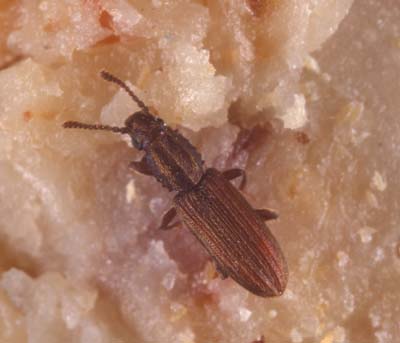
Adult merchant grain beetle, Oryzaephilus mercator.
(Photographer: L.J. Buss, University of Florida)
The merchant grain beetle feeds on mostly processed cereals such as rolled oats, rice, flour, cake mixes, macaroni and puffed rice. It is also found infesting nuts, coconut and candy bars made with nuts and puffed rice. It is worldwide in distribution and can tolerate cooler climates.
Adult merchant grain beetles have a dark brown, flattened body that is 3 mm long. They have well-developed wings and are known to fly. Adults have six projections on their thorax as do sawtoothed grain beetles. It is so similar to the sawtoothed grain beetle that they were once considered the same species. However, the merchant grain beetle has larger eyes located closer to the posterior of the head than the sawtoothed grain beetle. In addition, the hind part of the head is pointed on the side behind the eyes.
The female lays up to 190 eggs, either singly or in clusters. The larvae are yellowish with a brown head and less than 3 mm long when mature. The life cycle can be completed in 30 to 40 days, but may be much longer in unfavorable conditions. Adults usually live seven months and there may be as many as six to seven generations per year.
Images
To save the Web-optimized images shown below to your hard drive:
|
Click to access Display and Print quality images. |
|
Click to access Display and Print quality images. |
|
Click to access Display and Print quality images. |
|
Click to access Display and Print quality images. |